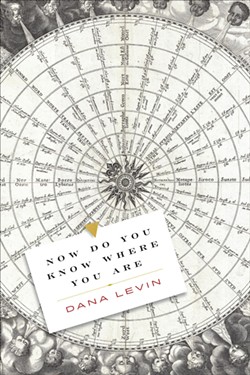I missed poet Dana Levin's call as I was pulling an illegal U-turn on Grand to head to Arsenal. Turns out the coffee shop where we'd agreed to meet in Tower Grove South was closing early. She'd gotten there on foot, so I offered to pick her up and try somewhere else. We got to another cafe on Grand right as they were closing, too. At this point, we gritted our teeth and headed to Starbucks since, if nothing else, corporate coffee is reliable.
We sat on the outside patio for a few minutes before realizing it was too windy and noisy to record our interview. Levin grabbed her croissant as we stood up to head inside and promptly dropped it on the ground, adding to the afternoon's fateful pile-on of tiny, unfortunate events. We laughed to stop from shaking our fists at the skies.
"Now do you know where you are?!" she exclaimed. I laughed even harder at the self-reference.
Now Do You Know Where You Are is Levin's fifth full poetry collection, published on April 19 by Copper Canyon Press. It is as much about navigating any given series of frustrating curveballs of modern life on a sunny spring afternoon as it is about the Trump presidency, about the pandemic, about all the things we mean when we say "with everything going on now." But Levin has been asking these huge questions since her first book, 1999's In the Surgical Theatre, was chosen by not-yet-Nobel laureate Louise Glück for the APR/Honickman First Book Prize.
In that book's poem "Smoke," the speaker asks "[w]here are we going, my nation my loved one, in this pit of water where we'll drown come Spring." Over 20 years later, Levin is still trying to arrive at the best questions, even as answers seem to remain elusive.
In the summer of 2017, Levin moved to St. Louis from Santa Fe and found herself in a literary scene that was thriving but mostly in pockets, as so many arts scenes seem to be in the Midwest. Levin remembers a conversation at a reading at the late, great Fort Gondo on Cherokee Street where she'd mentioned feeling delighted about this hidden gem of a city.
"Yeah, don't tell anybody," she was told jokingly. This gave Levin pause. "So that quality of 'don't tell anybody' creates wonderful intimacy and a personable vibe," she said during our interview, "and I wonder if it also hinders certain kinds of expansion."
As an example, Levin is interested in better and more funding as a board member of the Saint Louis Poetry Center, and as co-host, with Jen Tappenden, of that organization's premier reading series, Observable. When I asked Levin about her philosophy of being an artist who also feels responsible for civic engagement, she brought up a topic that weighs on her these days: the internal, personal work of a poet to honor a lyric impulse. This was on her mind throughout the writing of her new poetry collection. She's currently at work drafting a new prose book that deals with her childhood.
"The only thing that keeps me going is the belief that the interior work matters to the collective," she says. "I really believe it does if you do it honestly and it's not about navel-gazing or preserving your neuroses. I mean, really wanting to have a revolution inside the self and using the writing of poetry to make that happen? That matters!"
If this internal revolution sounds overtly spiritual, it is. Repeatedly throughout our interview, Levin referred to herself as a "vessel" for her poems, as well as for positive social change. She appears to compose herself from a vibrant mix of healthy skepticism, self-defeating humor and egoless confidence. This mixture is wisdom earned from knowing one's place in one's life and in the lineage of one's avocation. With a body of work grounded in the present and acutely aware of its ancestors, Levin hopes this internal lyric impulse can be the work of prophecy.
Allen Ginsberg is one archetype for this. In 1954, Ginsberg began writing and performing "Howl," a long poem that is now considered a classic of American poetry. At the time, however, it was not received as such, and ended up in court as the subject of an obscenity trial. What still draws Levin to the poem as an artistic object of expression is its prophetic nature. Ginsberg himself, in an interview with the Paris Review in 1966, discusses prophecy as feeling into a feeling that most people haven't felt yet but are about to. Or, at least, that's how Levin paraphrases him.
"And it's just a feeling Ginsberg is having. ... That, too, comes from this lyric impulse, this kind of weird way where you go inside the self and you really start to listen and you get past ego and then you're just a vehicle," she explains. "And the future can come through and change can come through. That is activism to me."
For Levin, then, the personal and artistic and political are not easily distinguishable.
"You know, there are a lot of conversations right now about, 'Can poems really change the world?'" she says. "And it's such an interesting thing to ask poetry to do. ... American culture is constantly asking, 'What is it good for?' meaning, 'What use can be made of it?' So, sometimes when we talk about poetry and activism, I get a little suspicious as to how much we have internalized this idea that [poetry's] got to be 'good for something' or else it's no good."
She seems to mean this suspicion to apply to herself as much as to us. Even as her books get published with the prestigious Copper Canyon Press, Levin has found herself as her own communications manager. In a contemporary world where poetry is not seen to be as commercially viable in the American market as pretty much any other genre, smaller presses focus scant resources on keeping the lights on, leaving little for even as well established a poet as Levin. She recently experienced an internal dissonance because of this market reality for her art: an unwillingness to even face her book as something for sale.
"My box of books came, and I wouldn't open it. ... In the meantime, I'm starting to feel really weird and upset and sick and not OK and I don't know what's going on with me ... and then I was like, 'We're gonna take these books out of the box,'" she says. "And I did it, and I started to weep really hard, and I realized that I had been spending the last two weeks dealing with my book as a product. I hadn't let myself have the experience of taking it out of the box and going, 'Oh my God, I made this thing!'"
As our conversation moved on, we circled again and again back to the idea that we seem to be afraid of communing in private with ourselves, something we've grown less accustomed to as a culture. Now Do You Know Where You Are, in advance reviews, has received practically universal acclaim, and this writer does not disagree with that praise. Yet, when even that seems not enough for us, when the book release is absent a dramatic unboxing video or a steady stream of social media posts in the weeks leading to publication date, we perhaps need to be honest about where we are now, about our priorities, about how we best respond.
"How to Hold the Heavy Weight of Now," from the new collection, ends in an image of the speaker reckoning with that response. The simple, yet not immediately intuitive, answer is generosity:
my palms open, pushing gently forward, leading my
body forward, I watched them
let a bird go, I watched my hands
make
an offering—








